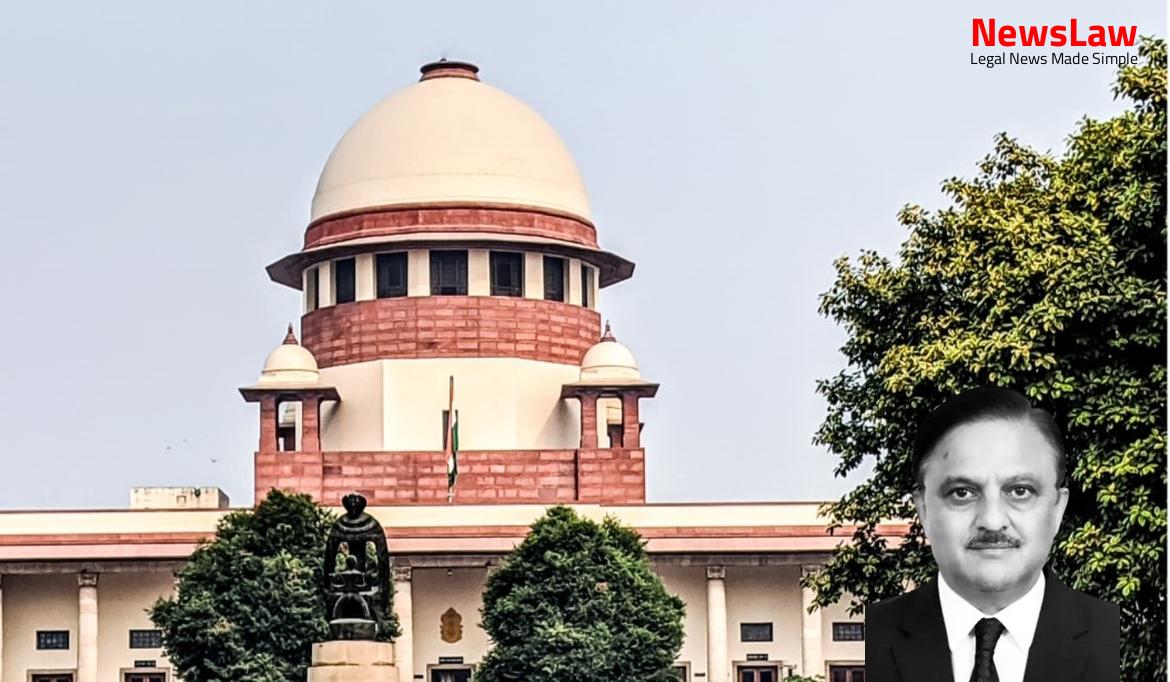In a recent landmark decision, the Supreme Court of India set aside the impugned judgment of the High Court in the case involving an Industrial Dispute Violation. The proceedings of Complaint Case No. 85479 of 2022 pending in the Court of the Chief Metropolitan Magistrate, Kanpur Nagar, Uttar Pradesh have been quashed. This judgment holds crucial implications for the interpretation and application of relevant legal provisions. Stay tuned for more insights on this significant legal development!
Facts
- Leave granted to appeal
- High Court dismissed petition under Section 482 of Cr. PC without considering merits of challenge to complaint
- Appellants filed petition to quash complaint filed by the second respondent under ID Act
- Cognizance taken of alleged offence on said complaint
Also Read: Court’s Jurisdiction in Re-appraising Arbitrator’s Findings
Arguments
- The counsel for the petitioner argued that there is no mention in the complaint about the breach of any specific settlement or award.
- It was further argued that as per Section 34(1) of the ID Act, any offense under the ID Act can only be addressed based on a complaint by or under the authority of the appropriate Government.
- The order under Section 34 did not cite a violation of Section 29 but only referred to the breach of an affidavit and Section 9A of the ID Act.
- The counsel emphasized that Section 34(1) does not permit a private individual to file a complaint under the ID Act.
- The senior counsel for the appellants contended that Section 29 of the ID Act applies when there is a breach of a settlement or award binding on the accused.
- In cases under Section 482 of Cr.PC, the High Court should exercise caution before interfering with the issuance of process.
- The counsel for the second respondent argued that the complaint specifically alleges a violation of an agreement incorporated in a joint affidavit filed before the Allahabad High Court.
- It was argued that the affidavit contained an agreement, and the complaint pertained to the breach of this agreement.
Also Read: Contrary Directions in Issuance of Letter of Intent
Analysis
- Section 29 of the Industrial Disputes Act pertains to penalties for breaching settlements or awards binding under the Act.
- A person committing a breach may face imprisonment up to six months, a fine, or both.
- In case of a continuing breach, a further fine of up to two hundred rupees per day may be imposed.
- The court, upon convicting the offender, can direct that part or whole of the fine be paid as compensation to the injured party.
- Section 34 states that no court below the rank of a Metropolitan Magistrate or a Judicial Magistrate of the first class can try offenses under the ID Act.
- Cognizance of such offenses can only be taken upon a complaint made by or under the authority of the appropriate Government.
- Before taking cognizance of a complaint, the Magistrate should have considered the averments and statements made in the complaint.
- The Magistrate should have verified if lawful authority was granted to file a complaint under Section 29 of the ID Act.
- Grant of authority under Section 34(1) is crucial and not an empty formality.
- No written settlement as defined in Section 2(p) of the ID Act was produced with the complaint in violation of Section 29.
- The complaint did not specifically allege a breach of any binding settlement or award under the ID Act.
- The statement of the complainant under Section 200 of the Cr.PC is to establish the truth on record.
- The order did not reference a violation of Section 29 or any specific offence under the ID Act.
- The affidavit referred vaguely to a settlement but lacked specific details or breach allegations.
- The authority under Section 34(1) must be specific to the offence intended to be filed.
- The purpose of the provision is to prevent frivolous complaints.
- The complaint also included allegations of a breach of Section 9A of the ID Act.
- In the present case, the court discussed the ratio of the judgment.
- The court emphasized that the ratio of a case is the core reasoning behind the decision.
- It was noted that discussing the ratio is essential for understanding the implications of the judgment.
- The court highlighted that the ratio provides the legal basis for the decision taken.
Also Read: Application for Stay in Civil Suit Rejected: Court’s Legal Analysis
Decision
- Remedies available to the second respondent are expressly kept open in law
- Impugned judgment of the High Court is set aside
- Proceedings of Complaint Case No.85479 of 2022 pending in the Court of the Chief Metropolitan Magistrate, Kanpur Nagar, Uttar Pradesh are quashed
- Summoning order is set aside
- The Appeal is allowed
Case Title: YUGAL SIKRI Vs. STATE OF U.P. (2024 INSC 597)
Case Number: Crl.A. No.-003324-003324 – 2024



